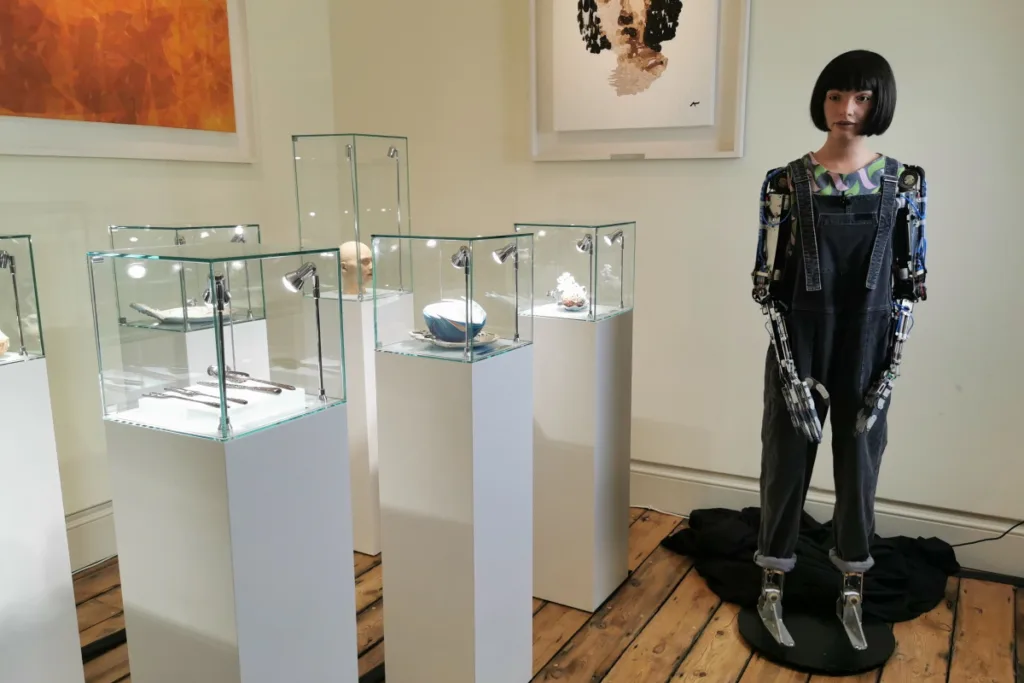Artificial intelligence (AI) has been the talk of the town for most of 2023, with the arrival of platforms such as ChatGPT and Midjourney thrusting the technology into the spotlight. But AI has been around for a lot longer than that.
Arguably, the most famous recent example of AI – pre-ChatGPT and Midjourney – is Ai-Da, a humanoid robot artist. Ai-Da, created in 2019 by gallerist Aidan Meller and Engineered Arts, is able to draw, paint, talk, track faces, and make expressive movements.
Ai-Da’s most recent work has been on show at the London Design Biennale at Somerset House. The exhibition – AI Mind Home – showcases some of the robot’s designs of everyday items, including plates and cutlery.
Despite Ai-Da’s ability to create “art”, Meller views his creation as an educational tool more than anything else.
“We’re actually using it as a critique and a question of where the whole AI world is going,” says Meller, speaking at the London Design Biennale. “It promises so much, it does incredible things – as you can see by some of these amazing objects that Ai-Da has created. But what are they actually delivering? What’s the domino effect of this technology?”
Keep your eyes peeled
This uncertainty is fuelling one of Meller’s biggest concerns around the technology – the “short-sightedness” of humans.
“We don’t know where it’s going to lead. And yet, so much of our bravado as humans is that we know what we’re doing and it’s going to be all alright, but we don’t know,” he says.
Meller compares it to the introduction and rise of social media, highlighting that it was a positive until it started creating “misinformation and addiction”.
“We didn’t know that when we started using it. Imagine that in the AI world, where there are so many different applications and ways that you could use AI,” Meller explains. “We don’t know the domino effect. So, my biggest worry – and why Ai-DA signed the letter to try and halt it – is because of that very aspect.”
One of the other concerns Meller is a common one. He fears what the technology may mean for the labour market, saying it’s “very frightening” that AI could replace humans in certain areas.
Nonetheless, with those job losses, he believes there will also be the creation of new jobs, but is unsure if that will all itself out.
“When the camera came in, everybody thought that the role of the painter was over, because of this amazing technology. Of course, it just created new industries. And I think AI is going to do that,” says Meller.
“I think there are still going to be some tricky moments. I think there’s going to be some perturbation in respect of how this technology is going to embed itself. But yes, I think the impact is going to be very real and very significant.”
A technology for good?
Meller points to advertising as a “prime subject” for AI, and an area where that impact is going to be most significant.
“I think the ones that will survive are the ones that will be using it, because it will be able to be so personalised and so capable of responding. I think the future of marketing is AI for sure,” explains Meller.
“It will supercharge great design, great marketing. I think that’s the whole point. AI is able to supercharge, so those who crack both the AI and the marketing will be very successful.”
Overall, Meller believes AI will be applied much like any other major technology – in that some people will use it positively, while others use it negatively – and that’s something we may just have to accept.
“It can be used for enormous good, absolutely. But it can also be used for enormous bad. Like all great technology, it has the ability to do both,” says Meller. “It’s a bit like asking the question, ‘is the internet good or bad?’ Well, of course, it’s both. It does great things. It does awful things. And all the aspects of AI are going to be able to do that.”
The London Design Biennale 2023 – The Global Game: Remapping Collaborations runs until 25 June 2023 at Somerset House, London. General admission from £23, Concessions £18, Children (aged 12-16) £13.









